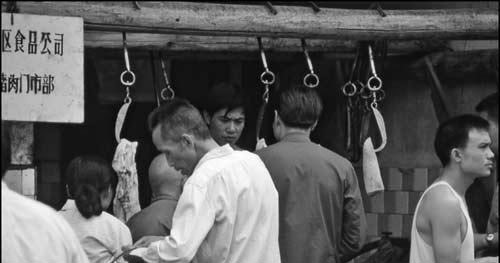3. 1982: Adopting the household contract responsibility system, linking remuneration to output
On January 1, 1982, the CPC Central Committee approved the Summary on National Rural Work Conference and pointed out that the various systems carried out in rural areas including contracting a piece of work or contracting work quotas with corresponding remuneration, were all production responsibility systems of the socialist collective economy.
 |
People select meat at a food market in the early days of reform and opening-up. |
In 1983, the CPC Central Committee issued a document, describing the household contract responsibility system as a great invention for Chinese farmers under the leadership of the CPC and a new development on Marxist Theory on Agricultural Cooperation in accordance with China's practical situation.
The Eighth Plenary Session of the 13th CPC Central Committee held from November 25 to 29 in 1991 passed the Decision of the CPC Central Committee on Further Enhancing Agriculture and Rural Work. The Decision established the status of the household contract responsibility system as a fundamental and long-term system in China's rural economic reform and promised to constantly improve it.
The household contract responsibility system, as the first step on rural economic system reform, broke down the old system of "daguofan" (literally, big pot of rice, meaning equal pay regardless of job responsibilities). Furthermore, with the promotion of the household contract responsibility system, the individual's output is linked with payment, which greatly increased farmers' enthusiasm and emancipated productivity in rural areas.
4. 1984: Putting forward the theory of Planned Commodity Economy
On October 20, 1984, the Third Plenary Session of the 12th CPC Central Committee was held in Beijing.
The Session unanimously passed the Decision of the CPC Central Committee on Economic Restructuring. It clearly states that the most urgent requirement for China's development is to further implement and fulfill the policy of invigorating the domestic economy and opening to the outside world in order to speed up the pace of economic restructuring particularly in urban areas. The primary task of reform is to establish a vigorous socialist economic system with Chinese characteristics, promoting the development of social productivity.
The Decision points out that in order to reform the existing planned system, the first necessary thing is to break with traditional concepts that contradict the planned economy with the commodity economy and then to have a clear understanding that the socialist planned economy is a planned commodity economy based upon a public-ownership system. The full development of a commodity economy is a prerequisite for realizing China's economic modernization.
The Decision clearly defined the basic goals and various requirements of reform, creating a condition for breaking down the planned economic system.
5. 1986: Beginning to reform state-owned enterprises
On December 5, 1986, the State Council promulgated Regulations on Furthering Enterprises Reform and Invigorating Enterprises.
The Regulations stipulate that all small-scale enterprises under the public ownership can actively try out lease and contract operations. The large- and middle-scale enterprises under the public ownership should carry out various operation responsibility systems. Some regions could select a few qualified large- and middle-scale state-owned enterprises to pilot a joint-stock system.
The issue of the Regulations was a significant step toward promoting urban economic restructuring, which was of great importance in further streamlining policies and devolving and delegating power, improving the external conditions of enterprises and broadening the business competency of enterprises as well as promoting the internal system reform of enterprises.
6. 1987: Putting forward the guideline policy emphasizing economic development
From October 25 to November 1, 1987, the 13th National Congress of the CPC was held. Zhao Ziyang, the then Party chief, delivered at the Congress a report entitled Marching Along the Road of Socialism with Chinese Characteristics.
The report expounded the theory of the primary stage of socialism and put forward the basic guideline of "one central task and two basic points" (taking economic development as the central task and upholding the Four Cardinal Principles and the reform and opening up policy in the great endeavor to develop socialism with Chinese characteristics, and never deviating from this line).
The Congress promulgated the Three-step Development Strategy towards modernization by mid-21st century and also set forth the task of political system reform.
The Three-Step Development Strategy: The first step is doubling the 1980 GDP and ensuring that the people have enough food and clothing. At the end of the 1980s, the government achieved this. The second step is to quadruple the 1980 GDP by the end of the 20th century. This was achieved in 1995, ahead of time. The third step is to increase the per-capita GDP to the level of the medium-developed countries by the mid-21st century, allowing the people to be well-off, with modernization basically realized.